Analyzing Cross-Cultural Management in Barclays' Global Expansion
VerifiedAdded on 2020/06/03
|11
|3277
|87
Essay
AI Summary
The project focuses on cross-cultural management, analyzing its impact on the trading practices of Barclays, a multinational bank. The discussion includes comparing UK and South African cultures through Hofstede’s cultural dimension theory, identifying potential barriers in South Africa, and exploring strategies to overcome these challenges.
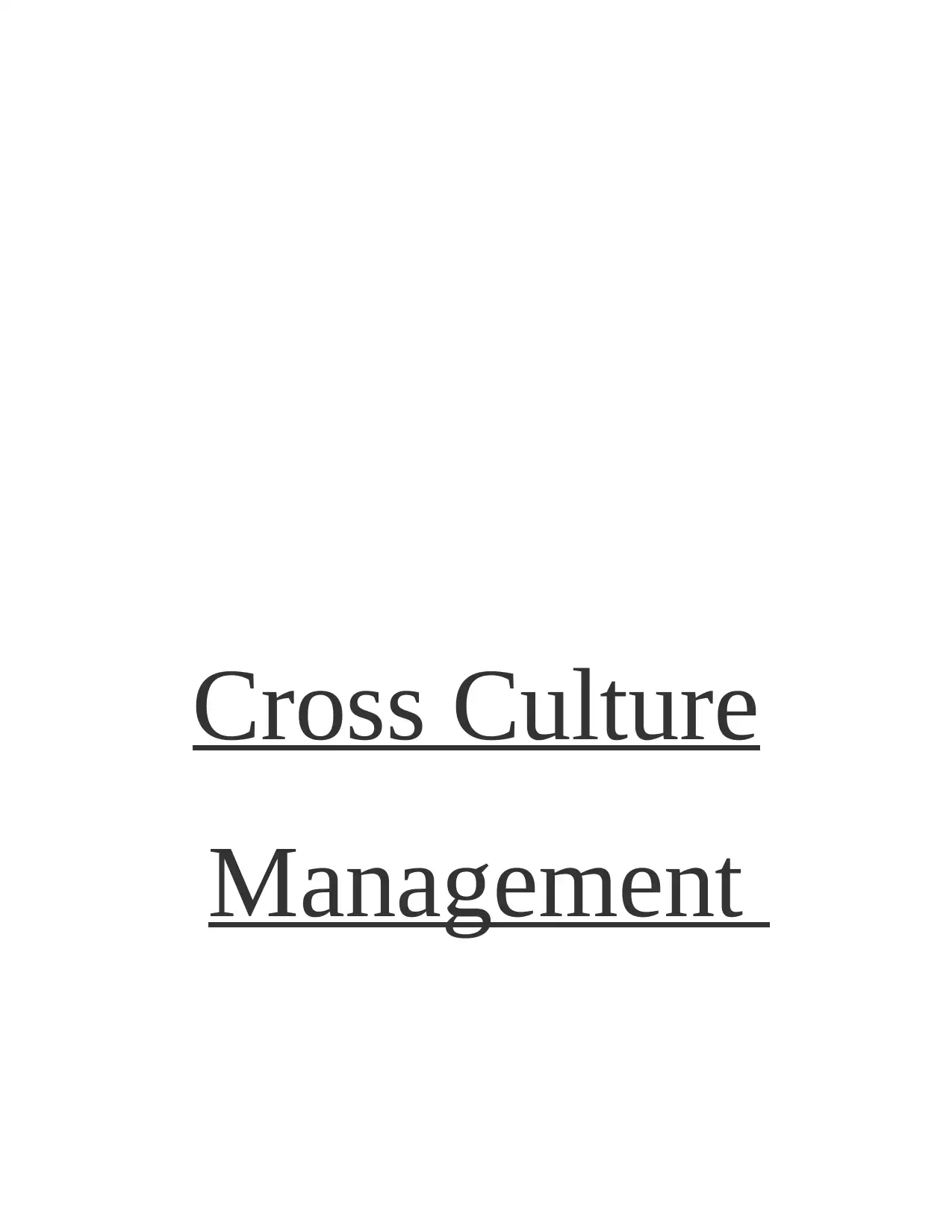
Cross Culture
Management
Management
Paraphrase This Document
Need a fresh take? Get an instant paraphrase of this document with our AI Paraphraser
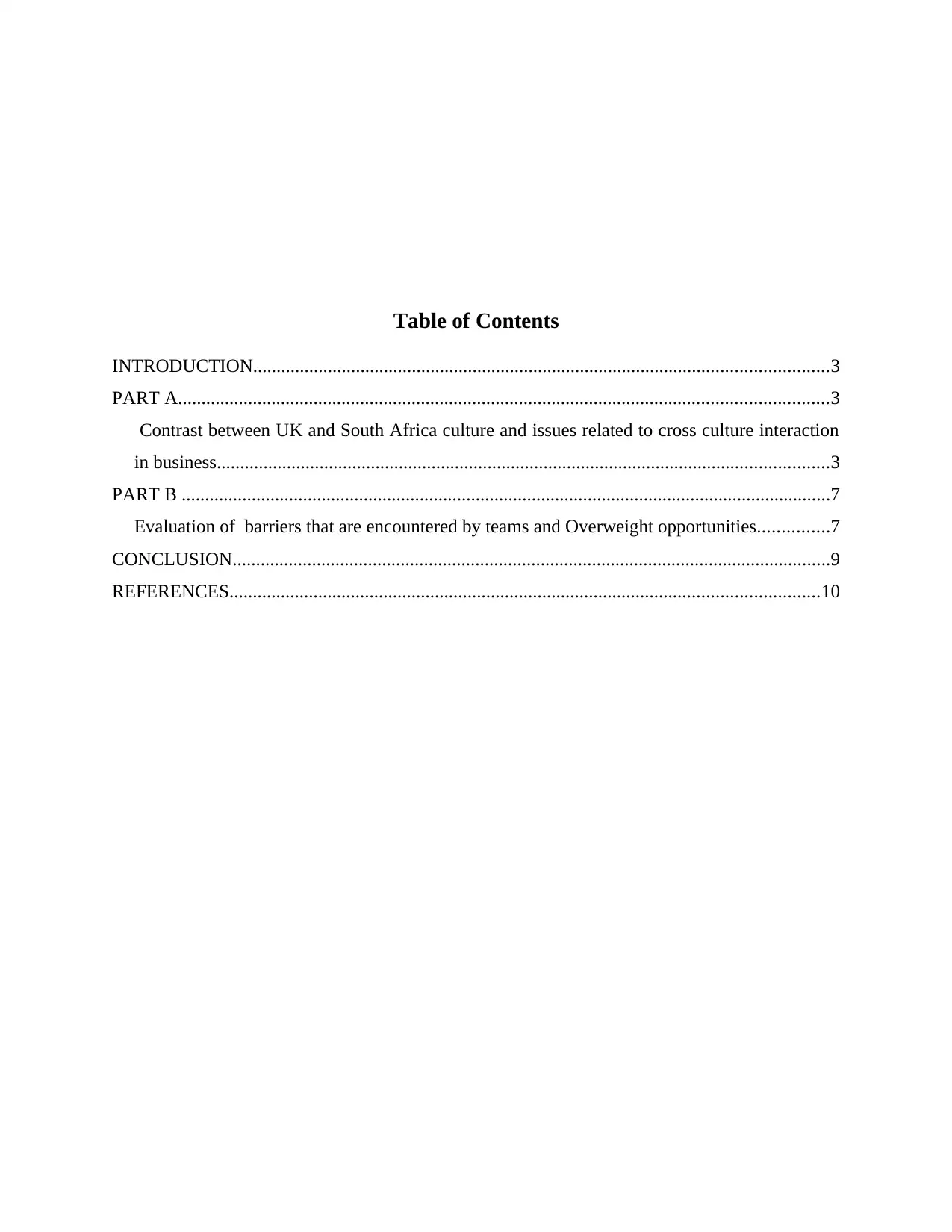
Table of Contents
INTRODUCTION...........................................................................................................................3
PART A...........................................................................................................................................3
Contrast between UK and South Africa culture and issues related to cross culture interaction
in business...................................................................................................................................3
PART B ...........................................................................................................................................7
Evaluation of barriers that are encountered by teams and Overweight opportunities...............7
CONCLUSION................................................................................................................................9
REFERENCES..............................................................................................................................10
INTRODUCTION...........................................................................................................................3
PART A...........................................................................................................................................3
Contrast between UK and South Africa culture and issues related to cross culture interaction
in business...................................................................................................................................3
PART B ...........................................................................................................................................7
Evaluation of barriers that are encountered by teams and Overweight opportunities...............7
CONCLUSION................................................................................................................................9
REFERENCES..............................................................................................................................10
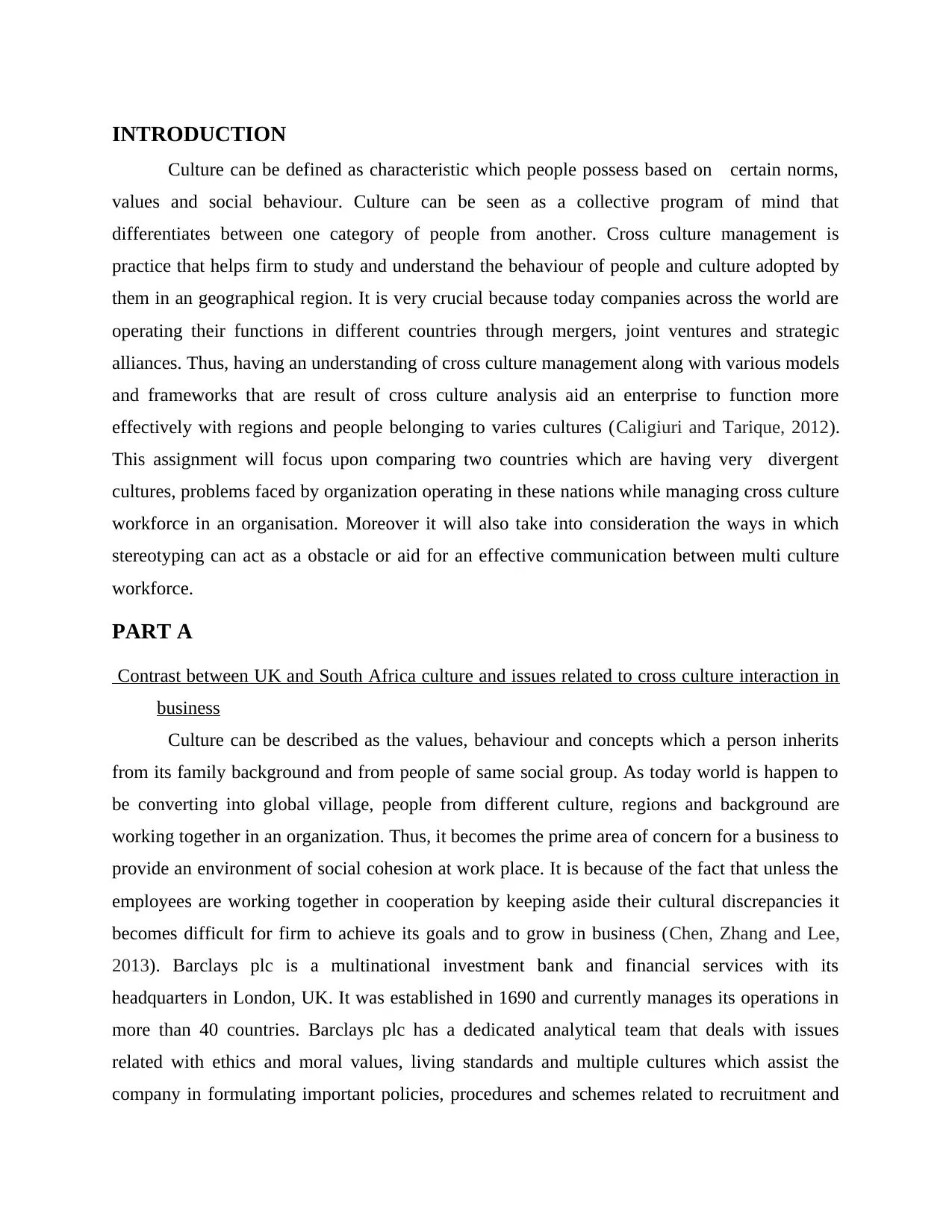
INTRODUCTION
Culture can be defined as characteristic which people possess based on certain norms,
values and social behaviour. Culture can be seen as a collective program of mind that
differentiates between one category of people from another. Cross culture management is
practice that helps firm to study and understand the behaviour of people and culture adopted by
them in an geographical region. It is very crucial because today companies across the world are
operating their functions in different countries through mergers, joint ventures and strategic
alliances. Thus, having an understanding of cross culture management along with various models
and frameworks that are result of cross culture analysis aid an enterprise to function more
effectively with regions and people belonging to varies cultures (Caligiuri and Tarique, 2012).
This assignment will focus upon comparing two countries which are having very divergent
cultures, problems faced by organization operating in these nations while managing cross culture
workforce in an organisation. Moreover it will also take into consideration the ways in which
stereotyping can act as a obstacle or aid for an effective communication between multi culture
workforce.
PART A
Contrast between UK and South Africa culture and issues related to cross culture interaction in
business
Culture can be described as the values, behaviour and concepts which a person inherits
from its family background and from people of same social group. As today world is happen to
be converting into global village, people from different culture, regions and background are
working together in an organization. Thus, it becomes the prime area of concern for a business to
provide an environment of social cohesion at work place. It is because of the fact that unless the
employees are working together in cooperation by keeping aside their cultural discrepancies it
becomes difficult for firm to achieve its goals and to grow in business (Chen, Zhang and Lee,
2013). Barclays plc is a multinational investment bank and financial services with its
headquarters in London, UK. It was established in 1690 and currently manages its operations in
more than 40 countries. Barclays plc has a dedicated analytical team that deals with issues
related with ethics and moral values, living standards and multiple cultures which assist the
company in formulating important policies, procedures and schemes related to recruitment and
Culture can be defined as characteristic which people possess based on certain norms,
values and social behaviour. Culture can be seen as a collective program of mind that
differentiates between one category of people from another. Cross culture management is
practice that helps firm to study and understand the behaviour of people and culture adopted by
them in an geographical region. It is very crucial because today companies across the world are
operating their functions in different countries through mergers, joint ventures and strategic
alliances. Thus, having an understanding of cross culture management along with various models
and frameworks that are result of cross culture analysis aid an enterprise to function more
effectively with regions and people belonging to varies cultures (Caligiuri and Tarique, 2012).
This assignment will focus upon comparing two countries which are having very divergent
cultures, problems faced by organization operating in these nations while managing cross culture
workforce in an organisation. Moreover it will also take into consideration the ways in which
stereotyping can act as a obstacle or aid for an effective communication between multi culture
workforce.
PART A
Contrast between UK and South Africa culture and issues related to cross culture interaction in
business
Culture can be described as the values, behaviour and concepts which a person inherits
from its family background and from people of same social group. As today world is happen to
be converting into global village, people from different culture, regions and background are
working together in an organization. Thus, it becomes the prime area of concern for a business to
provide an environment of social cohesion at work place. It is because of the fact that unless the
employees are working together in cooperation by keeping aside their cultural discrepancies it
becomes difficult for firm to achieve its goals and to grow in business (Chen, Zhang and Lee,
2013). Barclays plc is a multinational investment bank and financial services with its
headquarters in London, UK. It was established in 1690 and currently manages its operations in
more than 40 countries. Barclays plc has a dedicated analytical team that deals with issues
related with ethics and moral values, living standards and multiple cultures which assist the
company in formulating important policies, procedures and schemes related to recruitment and
⊘ This is a preview!⊘
Do you want full access?
Subscribe today to unlock all pages.

Trusted by 1+ million students worldwide
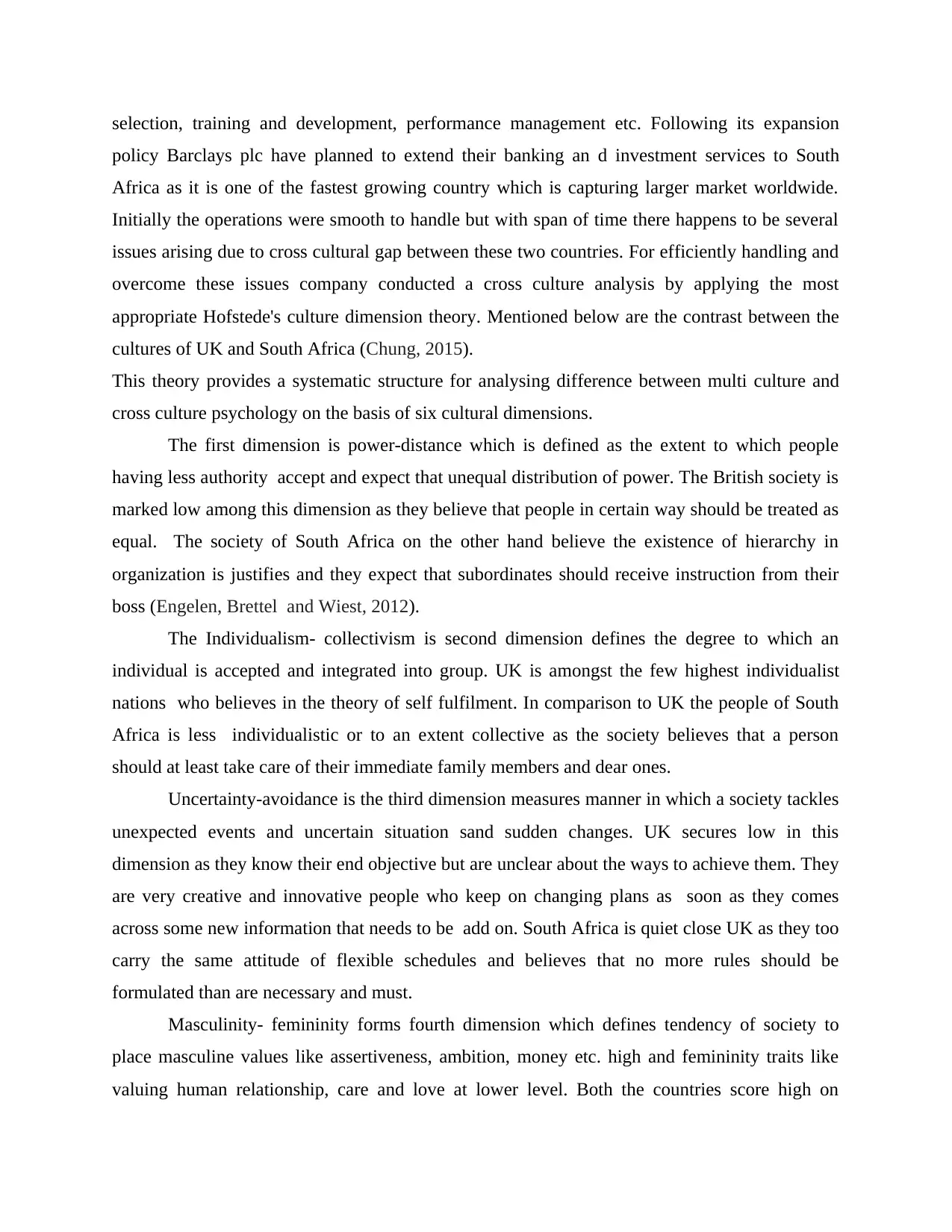
selection, training and development, performance management etc. Following its expansion
policy Barclays plc have planned to extend their banking an d investment services to South
Africa as it is one of the fastest growing country which is capturing larger market worldwide.
Initially the operations were smooth to handle but with span of time there happens to be several
issues arising due to cross cultural gap between these two countries. For efficiently handling and
overcome these issues company conducted a cross culture analysis by applying the most
appropriate Hofstede's culture dimension theory. Mentioned below are the contrast between the
cultures of UK and South Africa (Chung, 2015).
This theory provides a systematic structure for analysing difference between multi culture and
cross culture psychology on the basis of six cultural dimensions.
The first dimension is power-distance which is defined as the extent to which people
having less authority accept and expect that unequal distribution of power. The British society is
marked low among this dimension as they believe that people in certain way should be treated as
equal. The society of South Africa on the other hand believe the existence of hierarchy in
organization is justifies and they expect that subordinates should receive instruction from their
boss (Engelen, Brettel and Wiest, 2012).
The Individualism- collectivism is second dimension defines the degree to which an
individual is accepted and integrated into group. UK is amongst the few highest individualist
nations who believes in the theory of self fulfilment. In comparison to UK the people of South
Africa is less individualistic or to an extent collective as the society believes that a person
should at least take care of their immediate family members and dear ones.
Uncertainty-avoidance is the third dimension measures manner in which a society tackles
unexpected events and uncertain situation sand sudden changes. UK secures low in this
dimension as they know their end objective but are unclear about the ways to achieve them. They
are very creative and innovative people who keep on changing plans as soon as they comes
across some new information that needs to be add on. South Africa is quiet close UK as they too
carry the same attitude of flexible schedules and believes that no more rules should be
formulated than are necessary and must.
Masculinity- femininity forms fourth dimension which defines tendency of society to
place masculine values like assertiveness, ambition, money etc. high and femininity traits like
valuing human relationship, care and love at lower level. Both the countries score high on
policy Barclays plc have planned to extend their banking an d investment services to South
Africa as it is one of the fastest growing country which is capturing larger market worldwide.
Initially the operations were smooth to handle but with span of time there happens to be several
issues arising due to cross cultural gap between these two countries. For efficiently handling and
overcome these issues company conducted a cross culture analysis by applying the most
appropriate Hofstede's culture dimension theory. Mentioned below are the contrast between the
cultures of UK and South Africa (Chung, 2015).
This theory provides a systematic structure for analysing difference between multi culture and
cross culture psychology on the basis of six cultural dimensions.
The first dimension is power-distance which is defined as the extent to which people
having less authority accept and expect that unequal distribution of power. The British society is
marked low among this dimension as they believe that people in certain way should be treated as
equal. The society of South Africa on the other hand believe the existence of hierarchy in
organization is justifies and they expect that subordinates should receive instruction from their
boss (Engelen, Brettel and Wiest, 2012).
The Individualism- collectivism is second dimension defines the degree to which an
individual is accepted and integrated into group. UK is amongst the few highest individualist
nations who believes in the theory of self fulfilment. In comparison to UK the people of South
Africa is less individualistic or to an extent collective as the society believes that a person
should at least take care of their immediate family members and dear ones.
Uncertainty-avoidance is the third dimension measures manner in which a society tackles
unexpected events and uncertain situation sand sudden changes. UK secures low in this
dimension as they know their end objective but are unclear about the ways to achieve them. They
are very creative and innovative people who keep on changing plans as soon as they comes
across some new information that needs to be add on. South Africa is quiet close UK as they too
carry the same attitude of flexible schedules and believes that no more rules should be
formulated than are necessary and must.
Masculinity- femininity forms fourth dimension which defines tendency of society to
place masculine values like assertiveness, ambition, money etc. high and femininity traits like
valuing human relationship, care and love at lower level. Both the countries score high on
Paraphrase This Document
Need a fresh take? Get an instant paraphrase of this document with our AI Paraphraser
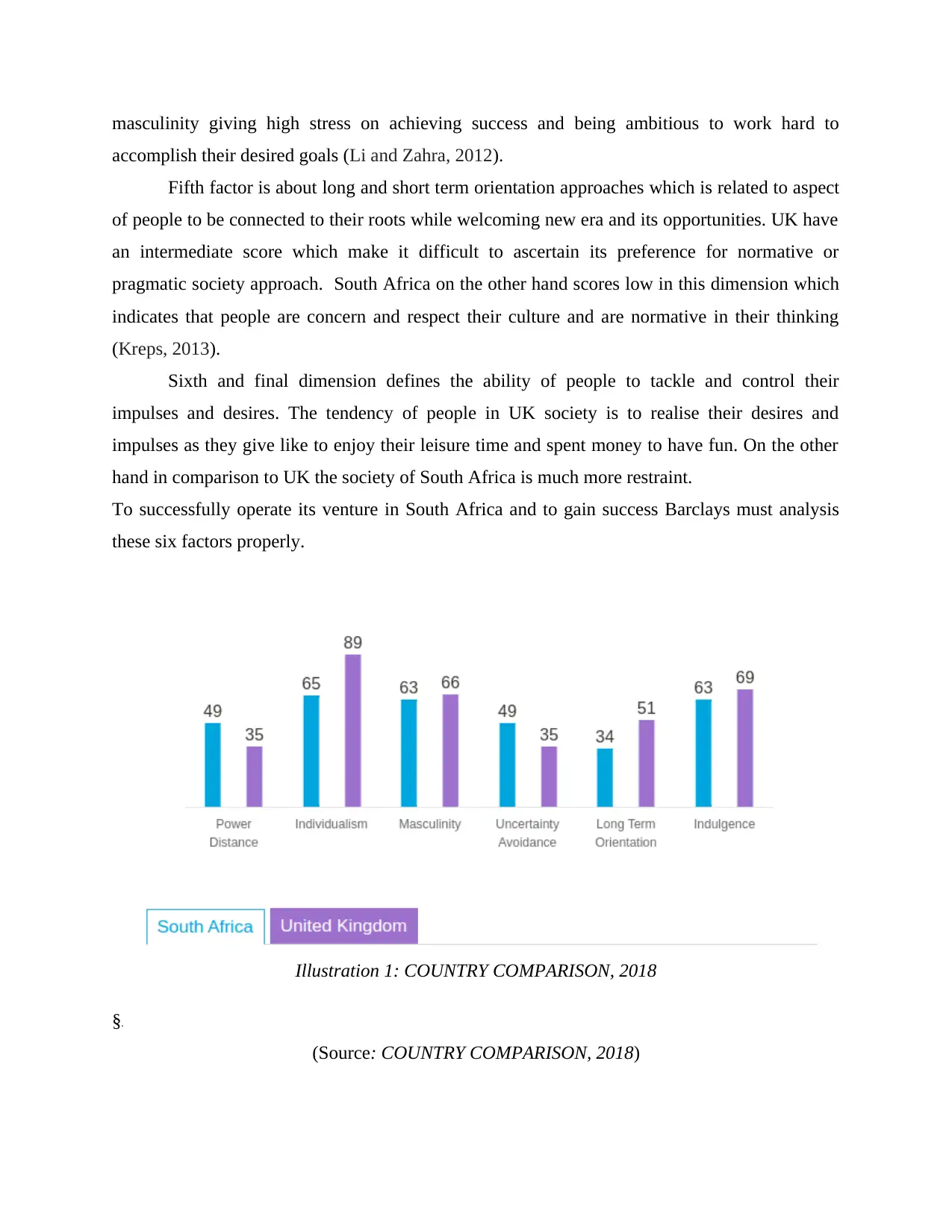
masculinity giving high stress on achieving success and being ambitious to work hard to
accomplish their desired goals (Li and Zahra, 2012).
Fifth factor is about long and short term orientation approaches which is related to aspect
of people to be connected to their roots while welcoming new era and its opportunities. UK have
an intermediate score which make it difficult to ascertain its preference for normative or
pragmatic society approach. South Africa on the other hand scores low in this dimension which
indicates that people are concern and respect their culture and are normative in their thinking
(Kreps, 2013).
Sixth and final dimension defines the ability of people to tackle and control their
impulses and desires. The tendency of people in UK society is to realise their desires and
impulses as they give like to enjoy their leisure time and spent money to have fun. On the other
hand in comparison to UK the society of South Africa is much more restraint.
To successfully operate its venture in South Africa and to gain success Barclays must analysis
these six factors properly.
Illustration 1: COUNTRY COMPARISON, 2018
§
(Source: COUNTRY COMPARISON, 2018)
accomplish their desired goals (Li and Zahra, 2012).
Fifth factor is about long and short term orientation approaches which is related to aspect
of people to be connected to their roots while welcoming new era and its opportunities. UK have
an intermediate score which make it difficult to ascertain its preference for normative or
pragmatic society approach. South Africa on the other hand scores low in this dimension which
indicates that people are concern and respect their culture and are normative in their thinking
(Kreps, 2013).
Sixth and final dimension defines the ability of people to tackle and control their
impulses and desires. The tendency of people in UK society is to realise their desires and
impulses as they give like to enjoy their leisure time and spent money to have fun. On the other
hand in comparison to UK the society of South Africa is much more restraint.
To successfully operate its venture in South Africa and to gain success Barclays must analysis
these six factors properly.
Illustration 1: COUNTRY COMPARISON, 2018
§
(Source: COUNTRY COMPARISON, 2018)
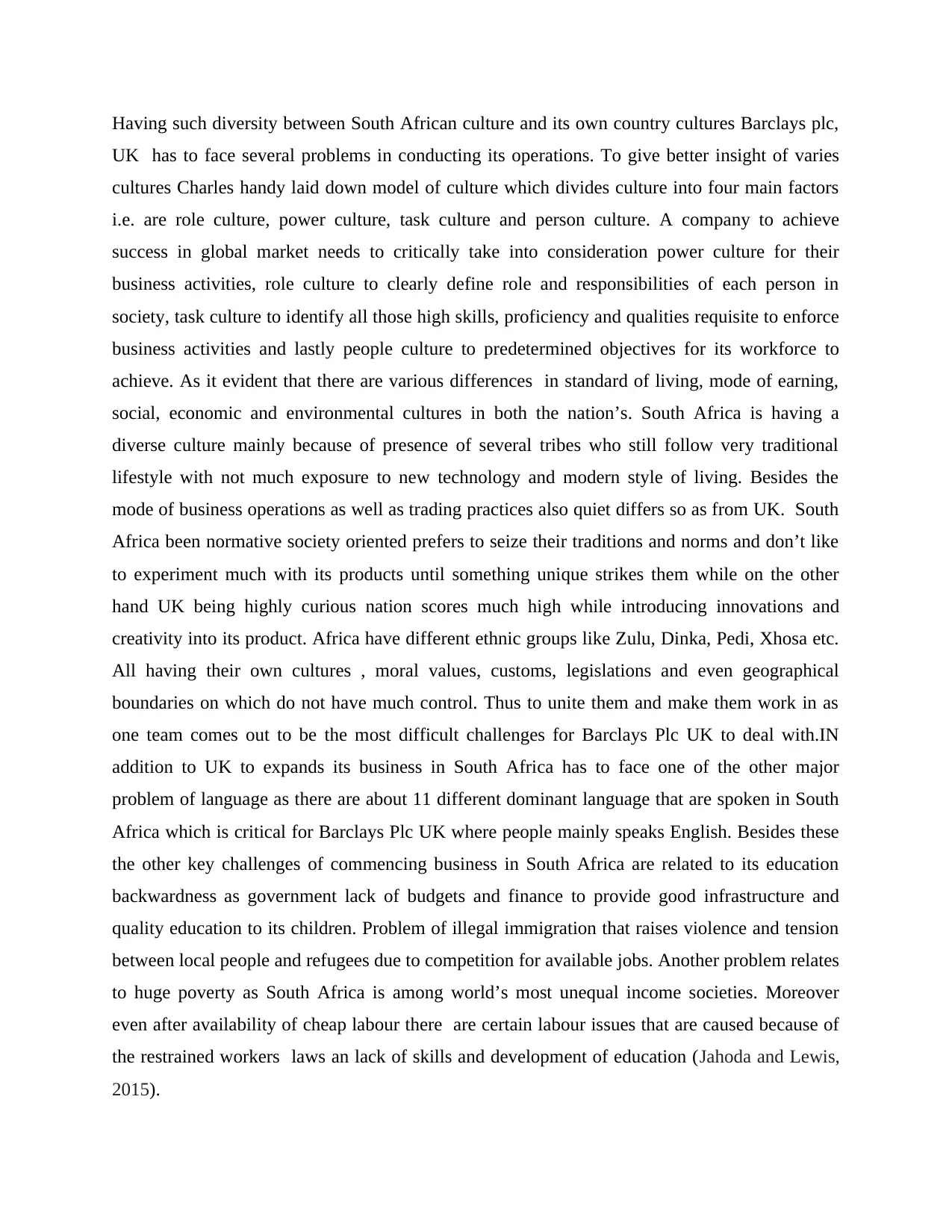
Having such diversity between South African culture and its own country cultures Barclays plc,
UK has to face several problems in conducting its operations. To give better insight of varies
cultures Charles handy laid down model of culture which divides culture into four main factors
i.e. are role culture, power culture, task culture and person culture. A company to achieve
success in global market needs to critically take into consideration power culture for their
business activities, role culture to clearly define role and responsibilities of each person in
society, task culture to identify all those high skills, proficiency and qualities requisite to enforce
business activities and lastly people culture to predetermined objectives for its workforce to
achieve. As it evident that there are various differences in standard of living, mode of earning,
social, economic and environmental cultures in both the nation’s. South Africa is having a
diverse culture mainly because of presence of several tribes who still follow very traditional
lifestyle with not much exposure to new technology and modern style of living. Besides the
mode of business operations as well as trading practices also quiet differs so as from UK. South
Africa been normative society oriented prefers to seize their traditions and norms and don’t like
to experiment much with its products until something unique strikes them while on the other
hand UK being highly curious nation scores much high while introducing innovations and
creativity into its product. Africa have different ethnic groups like Zulu, Dinka, Pedi, Xhosa etc.
All having their own cultures , moral values, customs, legislations and even geographical
boundaries on which do not have much control. Thus to unite them and make them work in as
one team comes out to be the most difficult challenges for Barclays Plc UK to deal with.IN
addition to UK to expands its business in South Africa has to face one of the other major
problem of language as there are about 11 different dominant language that are spoken in South
Africa which is critical for Barclays Plc UK where people mainly speaks English. Besides these
the other key challenges of commencing business in South Africa are related to its education
backwardness as government lack of budgets and finance to provide good infrastructure and
quality education to its children. Problem of illegal immigration that raises violence and tension
between local people and refugees due to competition for available jobs. Another problem relates
to huge poverty as South Africa is among world’s most unequal income societies. Moreover
even after availability of cheap labour there are certain labour issues that are caused because of
the restrained workers laws an lack of skills and development of education (Jahoda and Lewis,
2015).
UK has to face several problems in conducting its operations. To give better insight of varies
cultures Charles handy laid down model of culture which divides culture into four main factors
i.e. are role culture, power culture, task culture and person culture. A company to achieve
success in global market needs to critically take into consideration power culture for their
business activities, role culture to clearly define role and responsibilities of each person in
society, task culture to identify all those high skills, proficiency and qualities requisite to enforce
business activities and lastly people culture to predetermined objectives for its workforce to
achieve. As it evident that there are various differences in standard of living, mode of earning,
social, economic and environmental cultures in both the nation’s. South Africa is having a
diverse culture mainly because of presence of several tribes who still follow very traditional
lifestyle with not much exposure to new technology and modern style of living. Besides the
mode of business operations as well as trading practices also quiet differs so as from UK. South
Africa been normative society oriented prefers to seize their traditions and norms and don’t like
to experiment much with its products until something unique strikes them while on the other
hand UK being highly curious nation scores much high while introducing innovations and
creativity into its product. Africa have different ethnic groups like Zulu, Dinka, Pedi, Xhosa etc.
All having their own cultures , moral values, customs, legislations and even geographical
boundaries on which do not have much control. Thus to unite them and make them work in as
one team comes out to be the most difficult challenges for Barclays Plc UK to deal with.IN
addition to UK to expands its business in South Africa has to face one of the other major
problem of language as there are about 11 different dominant language that are spoken in South
Africa which is critical for Barclays Plc UK where people mainly speaks English. Besides these
the other key challenges of commencing business in South Africa are related to its education
backwardness as government lack of budgets and finance to provide good infrastructure and
quality education to its children. Problem of illegal immigration that raises violence and tension
between local people and refugees due to competition for available jobs. Another problem relates
to huge poverty as South Africa is among world’s most unequal income societies. Moreover
even after availability of cheap labour there are certain labour issues that are caused because of
the restrained workers laws an lack of skills and development of education (Jahoda and Lewis,
2015).
⊘ This is a preview!⊘
Do you want full access?
Subscribe today to unlock all pages.

Trusted by 1+ million students worldwide
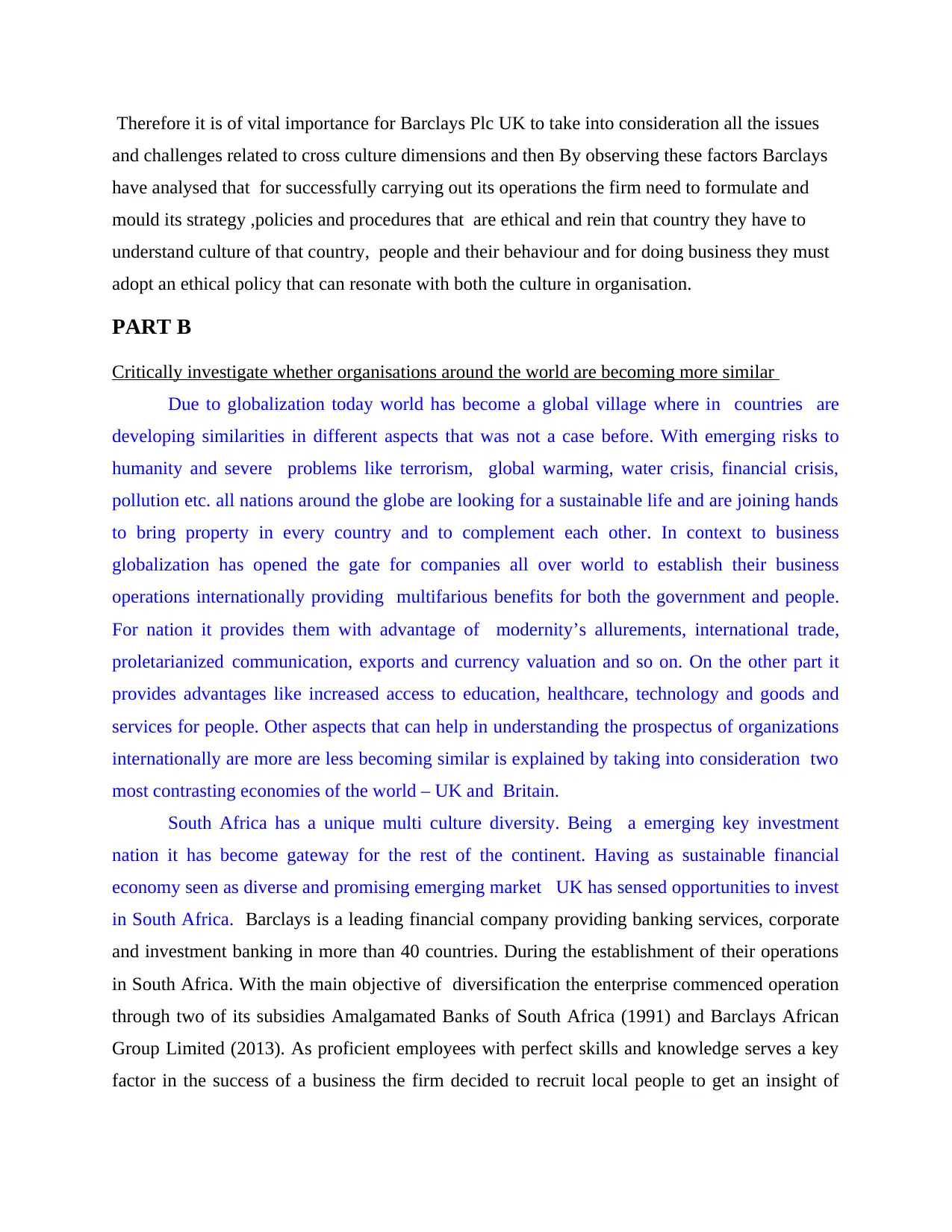
Therefore it is of vital importance for Barclays Plc UK to take into consideration all the issues
and challenges related to cross culture dimensions and then By observing these factors Barclays
have analysed that for successfully carrying out its operations the firm need to formulate and
mould its strategy ,policies and procedures that are ethical and rein that country they have to
understand culture of that country, people and their behaviour and for doing business they must
adopt an ethical policy that can resonate with both the culture in organisation.
PART B
Critically investigate whether organisations around the world are becoming more similar
Due to globalization today world has become a global village where in countries are
developing similarities in different aspects that was not a case before. With emerging risks to
humanity and severe problems like terrorism, global warming, water crisis, financial crisis,
pollution etc. all nations around the globe are looking for a sustainable life and are joining hands
to bring property in every country and to complement each other. In context to business
globalization has opened the gate for companies all over world to establish their business
operations internationally providing multifarious benefits for both the government and people.
For nation it provides them with advantage of modernity’s allurements, international trade,
proletarianized communication, exports and currency valuation and so on. On the other part it
provides advantages like increased access to education, healthcare, technology and goods and
services for people. Other aspects that can help in understanding the prospectus of organizations
internationally are more are less becoming similar is explained by taking into consideration two
most contrasting economies of the world – UK and Britain.
South Africa has a unique multi culture diversity. Being a emerging key investment
nation it has become gateway for the rest of the continent. Having as sustainable financial
economy seen as diverse and promising emerging market UK has sensed opportunities to invest
in South Africa. Barclays is a leading financial company providing banking services, corporate
and investment banking in more than 40 countries. During the establishment of their operations
in South Africa. With the main objective of diversification the enterprise commenced operation
through two of its subsidies Amalgamated Banks of South Africa (1991) and Barclays African
Group Limited (2013). As proficient employees with perfect skills and knowledge serves a key
factor in the success of a business the firm decided to recruit local people to get an insight of
and challenges related to cross culture dimensions and then By observing these factors Barclays
have analysed that for successfully carrying out its operations the firm need to formulate and
mould its strategy ,policies and procedures that are ethical and rein that country they have to
understand culture of that country, people and their behaviour and for doing business they must
adopt an ethical policy that can resonate with both the culture in organisation.
PART B
Critically investigate whether organisations around the world are becoming more similar
Due to globalization today world has become a global village where in countries are
developing similarities in different aspects that was not a case before. With emerging risks to
humanity and severe problems like terrorism, global warming, water crisis, financial crisis,
pollution etc. all nations around the globe are looking for a sustainable life and are joining hands
to bring property in every country and to complement each other. In context to business
globalization has opened the gate for companies all over world to establish their business
operations internationally providing multifarious benefits for both the government and people.
For nation it provides them with advantage of modernity’s allurements, international trade,
proletarianized communication, exports and currency valuation and so on. On the other part it
provides advantages like increased access to education, healthcare, technology and goods and
services for people. Other aspects that can help in understanding the prospectus of organizations
internationally are more are less becoming similar is explained by taking into consideration two
most contrasting economies of the world – UK and Britain.
South Africa has a unique multi culture diversity. Being a emerging key investment
nation it has become gateway for the rest of the continent. Having as sustainable financial
economy seen as diverse and promising emerging market UK has sensed opportunities to invest
in South Africa. Barclays is a leading financial company providing banking services, corporate
and investment banking in more than 40 countries. During the establishment of their operations
in South Africa. With the main objective of diversification the enterprise commenced operation
through two of its subsidies Amalgamated Banks of South Africa (1991) and Barclays African
Group Limited (2013). As proficient employees with perfect skills and knowledge serves a key
factor in the success of a business the firm decided to recruit local people to get an insight of
Paraphrase This Document
Need a fresh take? Get an instant paraphrase of this document with our AI Paraphraser
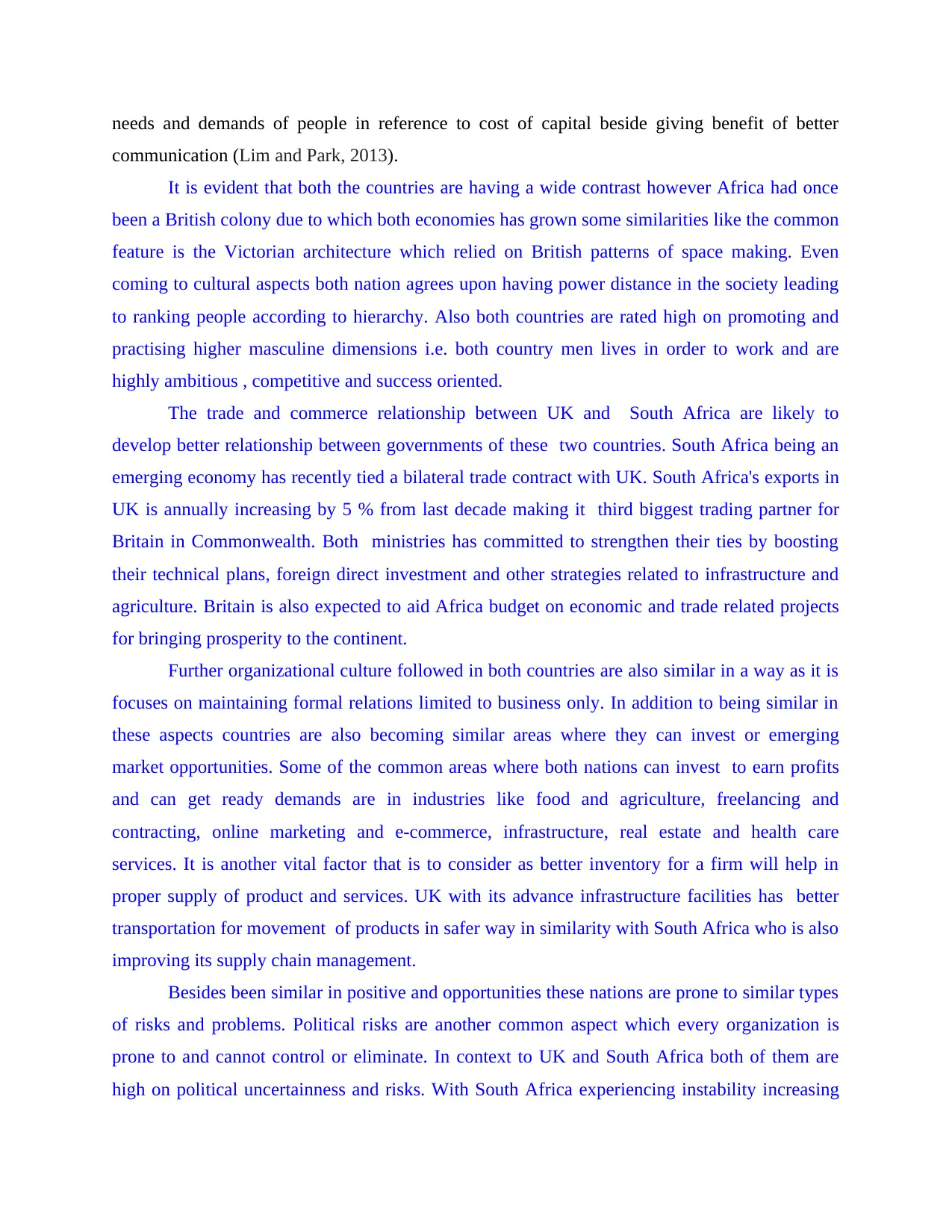
needs and demands of people in reference to cost of capital beside giving benefit of better
communication (Lim and Park, 2013).
It is evident that both the countries are having a wide contrast however Africa had once
been a British colony due to which both economies has grown some similarities like the common
feature is the Victorian architecture which relied on British patterns of space making. Even
coming to cultural aspects both nation agrees upon having power distance in the society leading
to ranking people according to hierarchy. Also both countries are rated high on promoting and
practising higher masculine dimensions i.e. both country men lives in order to work and are
highly ambitious , competitive and success oriented.
The trade and commerce relationship between UK and South Africa are likely to
develop better relationship between governments of these two countries. South Africa being an
emerging economy has recently tied a bilateral trade contract with UK. South Africa's exports in
UK is annually increasing by 5 % from last decade making it third biggest trading partner for
Britain in Commonwealth. Both ministries has committed to strengthen their ties by boosting
their technical plans, foreign direct investment and other strategies related to infrastructure and
agriculture. Britain is also expected to aid Africa budget on economic and trade related projects
for bringing prosperity to the continent.
Further organizational culture followed in both countries are also similar in a way as it is
focuses on maintaining formal relations limited to business only. In addition to being similar in
these aspects countries are also becoming similar areas where they can invest or emerging
market opportunities. Some of the common areas where both nations can invest to earn profits
and can get ready demands are in industries like food and agriculture, freelancing and
contracting, online marketing and e-commerce, infrastructure, real estate and health care
services. It is another vital factor that is to consider as better inventory for a firm will help in
proper supply of product and services. UK with its advance infrastructure facilities has better
transportation for movement of products in safer way in similarity with South Africa who is also
improving its supply chain management.
Besides been similar in positive and opportunities these nations are prone to similar types
of risks and problems. Political risks are another common aspect which every organization is
prone to and cannot control or eliminate. In context to UK and South Africa both of them are
high on political uncertainness and risks. With South Africa experiencing instability increasing
communication (Lim and Park, 2013).
It is evident that both the countries are having a wide contrast however Africa had once
been a British colony due to which both economies has grown some similarities like the common
feature is the Victorian architecture which relied on British patterns of space making. Even
coming to cultural aspects both nation agrees upon having power distance in the society leading
to ranking people according to hierarchy. Also both countries are rated high on promoting and
practising higher masculine dimensions i.e. both country men lives in order to work and are
highly ambitious , competitive and success oriented.
The trade and commerce relationship between UK and South Africa are likely to
develop better relationship between governments of these two countries. South Africa being an
emerging economy has recently tied a bilateral trade contract with UK. South Africa's exports in
UK is annually increasing by 5 % from last decade making it third biggest trading partner for
Britain in Commonwealth. Both ministries has committed to strengthen their ties by boosting
their technical plans, foreign direct investment and other strategies related to infrastructure and
agriculture. Britain is also expected to aid Africa budget on economic and trade related projects
for bringing prosperity to the continent.
Further organizational culture followed in both countries are also similar in a way as it is
focuses on maintaining formal relations limited to business only. In addition to being similar in
these aspects countries are also becoming similar areas where they can invest or emerging
market opportunities. Some of the common areas where both nations can invest to earn profits
and can get ready demands are in industries like food and agriculture, freelancing and
contracting, online marketing and e-commerce, infrastructure, real estate and health care
services. It is another vital factor that is to consider as better inventory for a firm will help in
proper supply of product and services. UK with its advance infrastructure facilities has better
transportation for movement of products in safer way in similarity with South Africa who is also
improving its supply chain management.
Besides been similar in positive and opportunities these nations are prone to similar types
of risks and problems. Political risks are another common aspect which every organization is
prone to and cannot control or eliminate. In context to UK and South Africa both of them are
high on political uncertainness and risks. With South Africa experiencing instability increasing
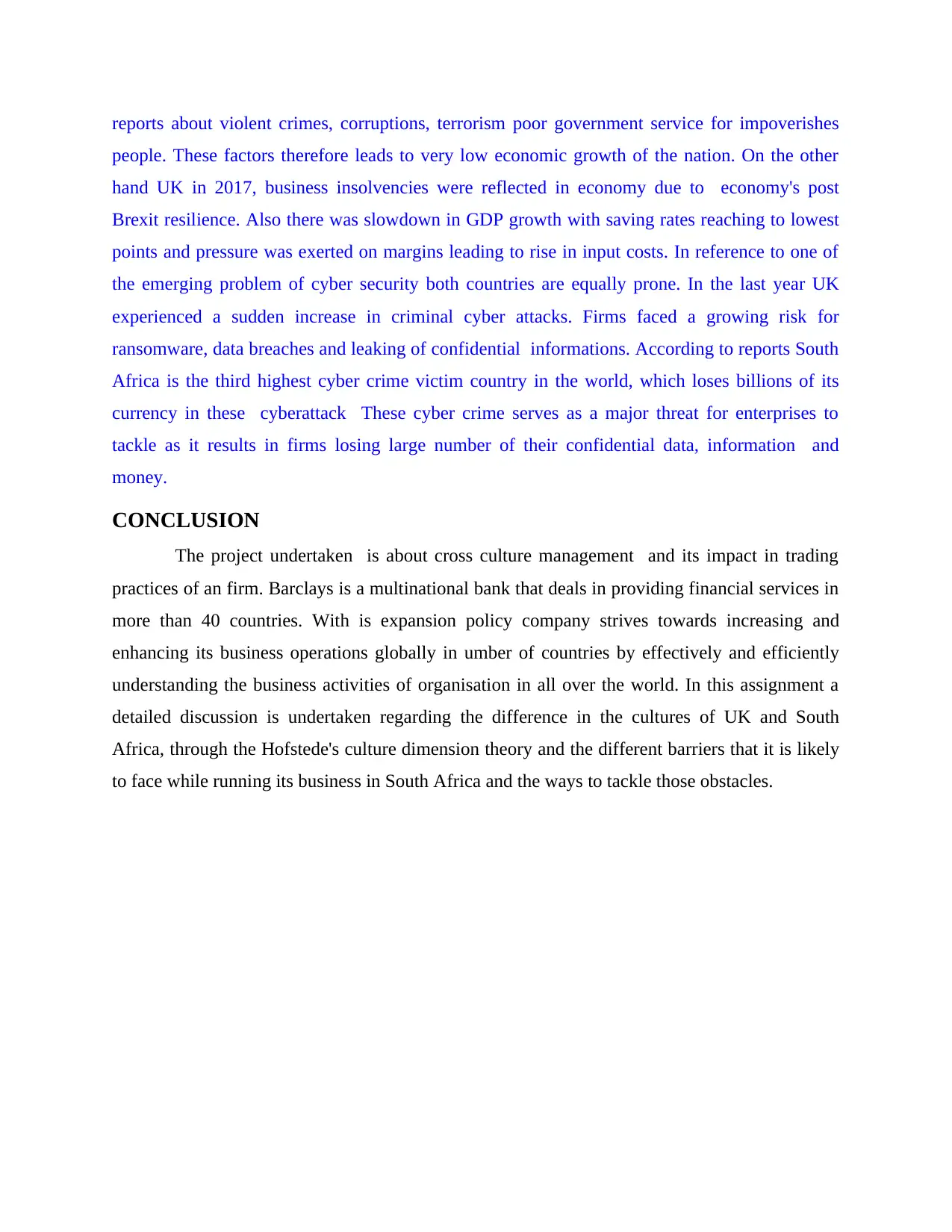
reports about violent crimes, corruptions, terrorism poor government service for impoverishes
people. These factors therefore leads to very low economic growth of the nation. On the other
hand UK in 2017, business insolvencies were reflected in economy due to economy's post
Brexit resilience. Also there was slowdown in GDP growth with saving rates reaching to lowest
points and pressure was exerted on margins leading to rise in input costs. In reference to one of
the emerging problem of cyber security both countries are equally prone. In the last year UK
experienced a sudden increase in criminal cyber attacks. Firms faced a growing risk for
ransomware, data breaches and leaking of confidential informations. According to reports South
Africa is the third highest cyber crime victim country in the world, which loses billions of its
currency in these cyberattack These cyber crime serves as a major threat for enterprises to
tackle as it results in firms losing large number of their confidential data, information and
money.
CONCLUSION
The project undertaken is about cross culture management and its impact in trading
practices of an firm. Barclays is a multinational bank that deals in providing financial services in
more than 40 countries. With is expansion policy company strives towards increasing and
enhancing its business operations globally in umber of countries by effectively and efficiently
understanding the business activities of organisation in all over the world. In this assignment a
detailed discussion is undertaken regarding the difference in the cultures of UK and South
Africa, through the Hofstede's culture dimension theory and the different barriers that it is likely
to face while running its business in South Africa and the ways to tackle those obstacles.
people. These factors therefore leads to very low economic growth of the nation. On the other
hand UK in 2017, business insolvencies were reflected in economy due to economy's post
Brexit resilience. Also there was slowdown in GDP growth with saving rates reaching to lowest
points and pressure was exerted on margins leading to rise in input costs. In reference to one of
the emerging problem of cyber security both countries are equally prone. In the last year UK
experienced a sudden increase in criminal cyber attacks. Firms faced a growing risk for
ransomware, data breaches and leaking of confidential informations. According to reports South
Africa is the third highest cyber crime victim country in the world, which loses billions of its
currency in these cyberattack These cyber crime serves as a major threat for enterprises to
tackle as it results in firms losing large number of their confidential data, information and
money.
CONCLUSION
The project undertaken is about cross culture management and its impact in trading
practices of an firm. Barclays is a multinational bank that deals in providing financial services in
more than 40 countries. With is expansion policy company strives towards increasing and
enhancing its business operations globally in umber of countries by effectively and efficiently
understanding the business activities of organisation in all over the world. In this assignment a
detailed discussion is undertaken regarding the difference in the cultures of UK and South
Africa, through the Hofstede's culture dimension theory and the different barriers that it is likely
to face while running its business in South Africa and the ways to tackle those obstacles.
⊘ This is a preview!⊘
Do you want full access?
Subscribe today to unlock all pages.

Trusted by 1+ million students worldwide
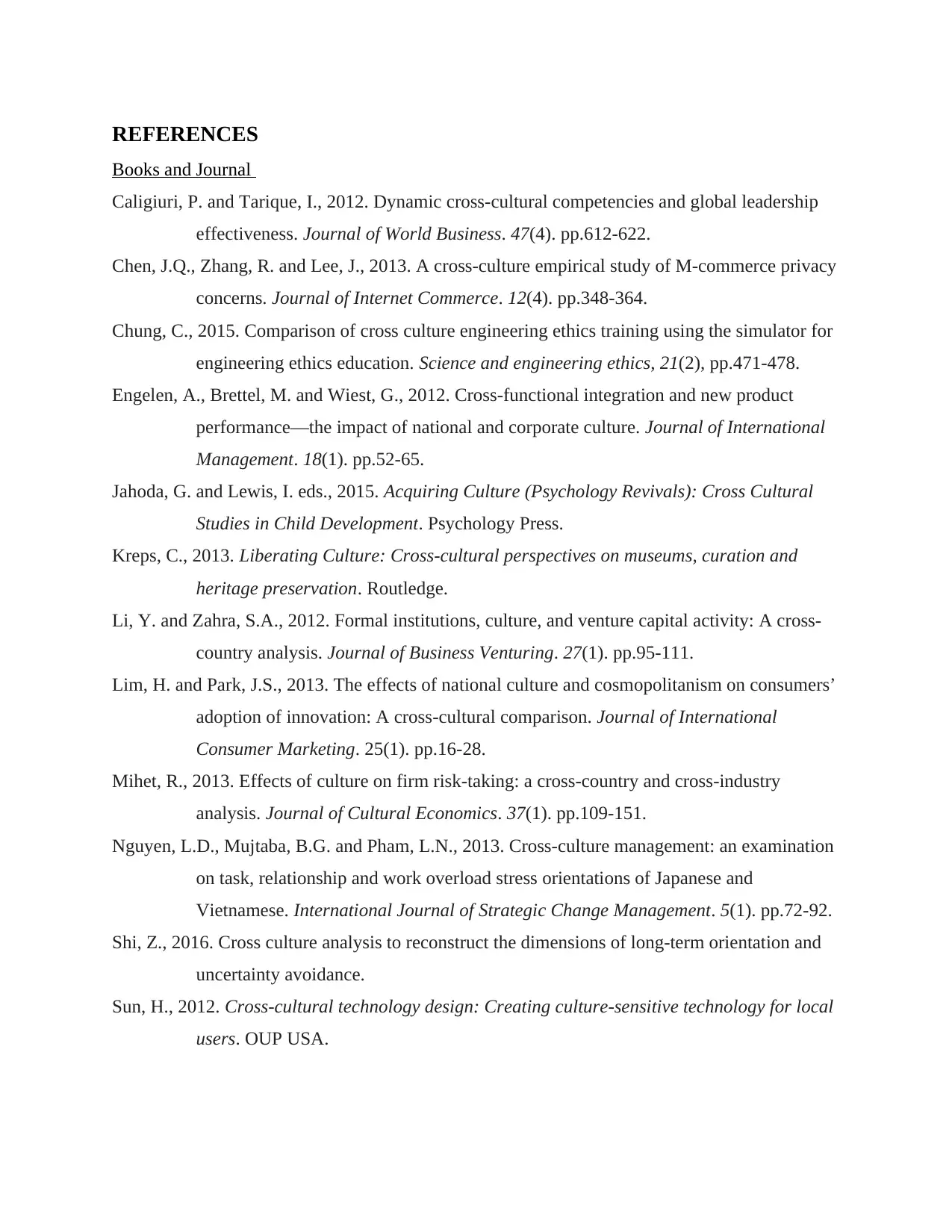
REFERENCES
Books and Journal
Caligiuri, P. and Tarique, I., 2012. Dynamic cross-cultural competencies and global leadership
effectiveness. Journal of World Business. 47(4). pp.612-622.
Chen, J.Q., Zhang, R. and Lee, J., 2013. A cross-culture empirical study of M-commerce privacy
concerns. Journal of Internet Commerce. 12(4). pp.348-364.
Chung, C., 2015. Comparison of cross culture engineering ethics training using the simulator for
engineering ethics education. Science and engineering ethics, 21(2), pp.471-478.
Engelen, A., Brettel, M. and Wiest, G., 2012. Cross-functional integration and new product
performance—the impact of national and corporate culture. Journal of International
Management. 18(1). pp.52-65.
Jahoda, G. and Lewis, I. eds., 2015. Acquiring Culture (Psychology Revivals): Cross Cultural
Studies in Child Development. Psychology Press.
Kreps, C., 2013. Liberating Culture: Cross-cultural perspectives on museums, curation and
heritage preservation. Routledge.
Li, Y. and Zahra, S.A., 2012. Formal institutions, culture, and venture capital activity: A cross-
country analysis. Journal of Business Venturing. 27(1). pp.95-111.
Lim, H. and Park, J.S., 2013. The effects of national culture and cosmopolitanism on consumers’
adoption of innovation: A cross-cultural comparison. Journal of International
Consumer Marketing. 25(1). pp.16-28.
Mihet, R., 2013. Effects of culture on firm risk-taking: a cross-country and cross-industry
analysis. Journal of Cultural Economics. 37(1). pp.109-151.
Nguyen, L.D., Mujtaba, B.G. and Pham, L.N., 2013. Cross-culture management: an examination
on task, relationship and work overload stress orientations of Japanese and
Vietnamese. International Journal of Strategic Change Management. 5(1). pp.72-92.
Shi, Z., 2016. Cross culture analysis to reconstruct the dimensions of long-term orientation and
uncertainty avoidance.
Sun, H., 2012. Cross-cultural technology design: Creating culture-sensitive technology for local
users. OUP USA.
Books and Journal
Caligiuri, P. and Tarique, I., 2012. Dynamic cross-cultural competencies and global leadership
effectiveness. Journal of World Business. 47(4). pp.612-622.
Chen, J.Q., Zhang, R. and Lee, J., 2013. A cross-culture empirical study of M-commerce privacy
concerns. Journal of Internet Commerce. 12(4). pp.348-364.
Chung, C., 2015. Comparison of cross culture engineering ethics training using the simulator for
engineering ethics education. Science and engineering ethics, 21(2), pp.471-478.
Engelen, A., Brettel, M. and Wiest, G., 2012. Cross-functional integration and new product
performance—the impact of national and corporate culture. Journal of International
Management. 18(1). pp.52-65.
Jahoda, G. and Lewis, I. eds., 2015. Acquiring Culture (Psychology Revivals): Cross Cultural
Studies in Child Development. Psychology Press.
Kreps, C., 2013. Liberating Culture: Cross-cultural perspectives on museums, curation and
heritage preservation. Routledge.
Li, Y. and Zahra, S.A., 2012. Formal institutions, culture, and venture capital activity: A cross-
country analysis. Journal of Business Venturing. 27(1). pp.95-111.
Lim, H. and Park, J.S., 2013. The effects of national culture and cosmopolitanism on consumers’
adoption of innovation: A cross-cultural comparison. Journal of International
Consumer Marketing. 25(1). pp.16-28.
Mihet, R., 2013. Effects of culture on firm risk-taking: a cross-country and cross-industry
analysis. Journal of Cultural Economics. 37(1). pp.109-151.
Nguyen, L.D., Mujtaba, B.G. and Pham, L.N., 2013. Cross-culture management: an examination
on task, relationship and work overload stress orientations of Japanese and
Vietnamese. International Journal of Strategic Change Management. 5(1). pp.72-92.
Shi, Z., 2016. Cross culture analysis to reconstruct the dimensions of long-term orientation and
uncertainty avoidance.
Sun, H., 2012. Cross-cultural technology design: Creating culture-sensitive technology for local
users. OUP USA.
Paraphrase This Document
Need a fresh take? Get an instant paraphrase of this document with our AI Paraphraser
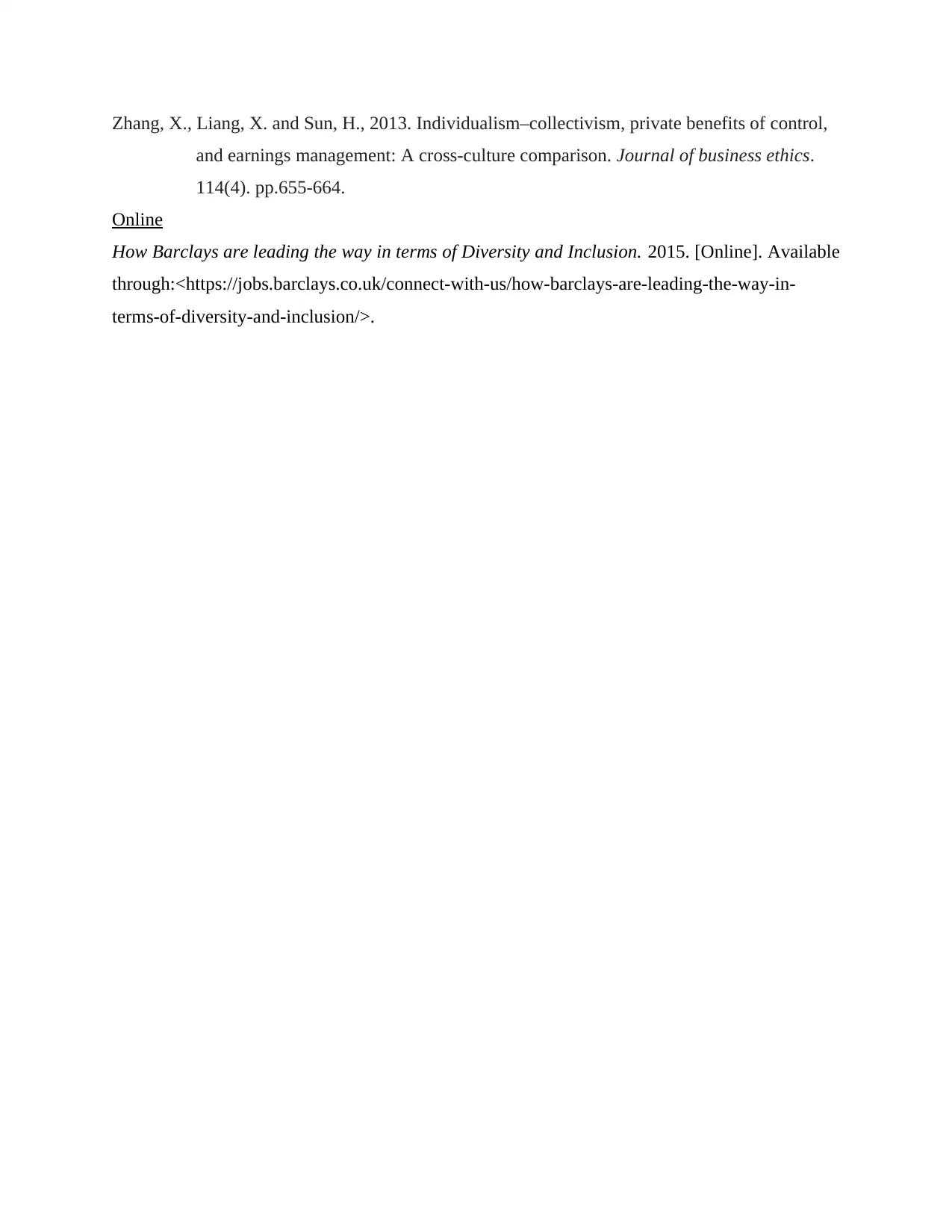
Zhang, X., Liang, X. and Sun, H., 2013. Individualism–collectivism, private benefits of control,
and earnings management: A cross-culture comparison. Journal of business ethics.
114(4). pp.655-664.
Online
How Barclays are leading the way in terms of Diversity and Inclusion. 2015. [Online]. Available
through:<https://jobs.barclays.co.uk/connect-with-us/how-barclays-are-leading-the-way-in-
terms-of-diversity-and-inclusion/>.
and earnings management: A cross-culture comparison. Journal of business ethics.
114(4). pp.655-664.
Online
How Barclays are leading the way in terms of Diversity and Inclusion. 2015. [Online]. Available
through:<https://jobs.barclays.co.uk/connect-with-us/how-barclays-are-leading-the-way-in-
terms-of-diversity-and-inclusion/>.
1 out of 11
Related Documents
Your All-in-One AI-Powered Toolkit for Academic Success.
+13062052269
info@desklib.com
Available 24*7 on WhatsApp / Email
![[object Object]](/_next/static/media/star-bottom.7253800d.svg)
Unlock your academic potential
Copyright © 2020–2025 A2Z Services. All Rights Reserved. Developed and managed by ZUCOL.





